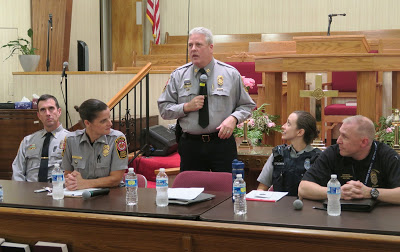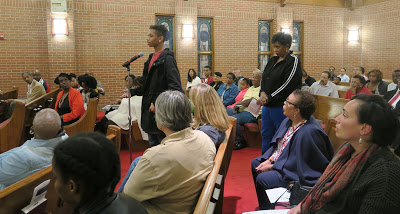Police work on building trust with the community
 |
| Capt. Thomas Rogers, commander of the Mason Police District speaks at a forum on police-community relations. From the left: Officer Brian Hall, Officer Chantel Cochrane, Crime Prevention Officer Kat O’Leary, and Lt. William Giger. |
on police-community relations Oct. 13 raised concerns about racial profiling,
the use of force, racist officers, and the need for a more diverse police force
and better training programs.
audience, at Mt. Pleasant Baptist Church on Lincolnia Road, that
they are aware of those issues and that efforts are under way to make improvements within the Fairfax County Police Department.
building trust and establishing a positive relationship before problems arise.
 |
| A youth asks a question. |
established by Board of Supervisors Chair Sharon Bulova with input from the
NAACP in 2015 in the wake of the shooting of an African-American youth by a white officer in Ferguson, Mo., in 2014, which led to civil
unrest.
enforcement agencies, the fire department, the school system, the faith
community, county agencies, and other organizations. The monthly meetings are open
to the public.
the police and public get to know one another, the police officers on the panel spoke briefly about their families and career
backgrounds before answering questions from the audience.
Mason Police District, said his priorities are ethical leadership, community
engagement, and “respect for the sanctity of life.”
with dignity and respect,” said Rogers, who grew up in Fairfax County, went to
Edison High School, and served a 10-year stint at the Mason Police Station in
the 1990s.
acknowledged. “Sometimes you have to use force. But it must be reasonable to
the situation.”
revising its policy on the use of force and plans to present its recommendations to the Fairfax County Board of Supervisors by the end of the
year.
job is to sell compliance.” The goal is “to
use the absolute minimum use of force.”
said Officer Eddy Azcarate. Officers look for suspicious behavior – speeding,
sitting in a car for hours, circling a neighborhood, for example. “It’s the
behavior, what you do, not who you are,” he said.
a police officer, he’s back at that parking lot getting to know the residents.
a car with a black driver, Officer Gary Moore Jr., who is African-American,
said, “if you’re speeding I’m going to pull you over. It’s impossible to see
the race of a person until we get to the car.”
good kid” and was expelled from his high school in a small town in Mississippi.
He decided to get into law enforcement after serving in the Marines.
mistreating a black person, Lt. William Giger said, “any officer who sees
another officer acting wrongly is compelled to report it to a supervisor and
could be held accountable for not doing that.” All allegations of bias and
racial profiling are investigated by the Internal Affairs Department.
college, shared a video about how to act during a police stop. The main thing is to stay in your car
and keep your hands on the steering wheel.
honest about why you’re upset. You can ask for a supervisor or another
officer, but remain respectful.
legitimate police car, pull into a well-lighted public area. You can call 911 if you’re
uncomfortable.
admission of guilt. You can contest it in court. If you fail to sign a summons
you could be arrested.
night and found the driver had a loaded gun and was wanted for murder and
setting someone on fire in Texas.
the past three years, Azcarate noted, and that’s tiny compared to the 100,000+ police
interactions during that period.
in Virginia, seven involved black males. There were 754 incidents nationwide
this year.
2015 and just one in 2016 that involved the FCPD. That one involved the hold-up of a jewelry store in
Springfield. The suspect shot at a police officer and the officer opened fire and
missed. [A Fairfax County sheriff’s deputy shot an killed a mental patient outside Inova Fairfax Hospital in August.]
shootings compared to other parts of the country because “we have great
training.” The vast majority of police departments are much smaller and are
less able to screen out the “bad apples.”
not true,” he said.
FCPD Chief Edwin Roessler Jr. would like to outfit officers with body cameras but several issues need to be resolved first, including how to ensure the privacy of victims and how to store the massive amounts of footage. FCPS is also waiting to see what the General Assembly will do about a proposed bill on the use of body cameras.
diversity, and ethics, said Officer Chantel Cochrane, who has four children and
had been previously based at the police academy. The training recognizes that
everyone has biases, she said, but “you can’t let biases affect the way you
enforce the law.”
moved crisis intervention to the beginning of the course and added a class on
the sanctity of life, Cochrane said.
According to Cochrane, Roessler is committed to improving
diversity on the force. Currently, 82 percent of the officers are white, 8
percent are black, 5 percent are Asian and 5 percent are Hispanic.
white, 10 percent black, 18 percent Asian, and 16 percent Hispanic.
increase diversity on the force while still maintaining high standards, said police chaplain Michael
Shochet, the senior cantor at Temple Rodef Shalom who served on the Baltimore
police force many years ago. FCPD prefers recruits with a college degree and requires
them to have a clean record.
At the end of the forum, Rev. Carl Johnson, the pastor at Mt.
Pleasant Baptist Church, said the meeting underscored the importance of the
community and police and working together. “We learned to respect one another,” he said.


Love and appreciate the Fairfax County police department!!!
How does a Mason Police District commander establish trust when they are never around long enough for even the community leaders to learn their names? A sense that there is no point in getting to know the commander because they won't be around long is not how you build trust. And it would help if a few of the patrolmen lived in the district.
Agreed, Captain Lee was the only one that stuck around long enough for the community to engage and trust him. This bait and switch is bad for Mason, bad for community relations and shows disrespect towards the citizens of Mason by County and FCPD leadership.
We love Officer Azcarate! He ws instrumental in preventing gang violence from escalating in Fairfax, and has awesome community outreach. I know him as a fellow parent & a speaker at my kids' Scout troop meetings.